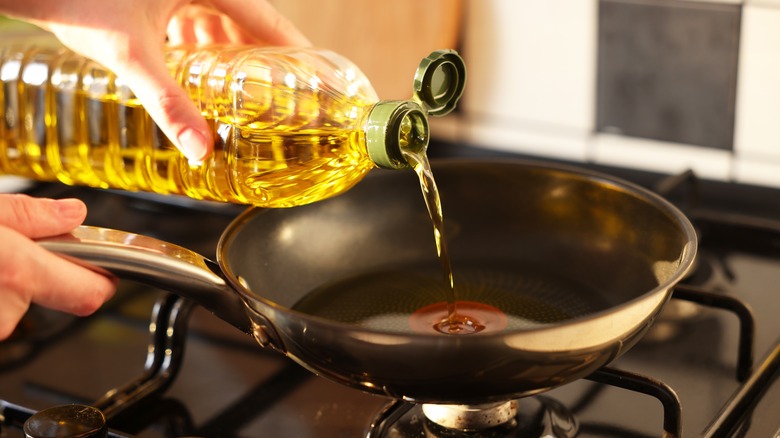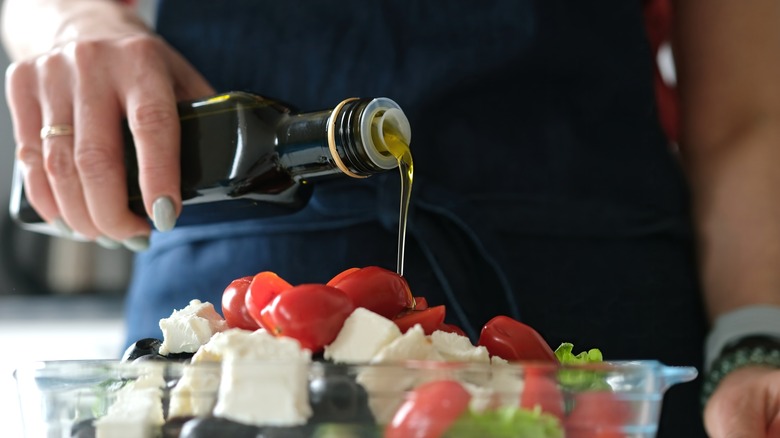When Should You Use A Neutral Oil?
Among the wide variety of oils on supermarket shelves, some are neutral while others are anything but. Due to their refining process, neutral oils impart very little to no flavor or aroma, allowing the other ingredients to take center stage. It's the difference between soft-spoken, introverted canola oil and high-quality extra-virgin olive oil that announces its presence with a robust, grassy aroma and taste, or sesame oil, an ingredient very noticeable in dishes like sweet and spicy sesame chicken.
This distinction matters in cooking. When you don't want the oil to provide a large part of the flavor in your dish, neutral is the way to go. These low-to-no-flavor oils include safflower oil, grapeseed oil, avocado oil, corn oil, canola (rapeseed) oil, refined coconut or olive oil, vegetable oil, sunflower oil, and peanut oil.
Neutral oils also tend to have a higher smoke point than the more strongly flavored unrefined or virgin oils, enabling them to withstand high temperatures without breaking down or smoking up your kitchen. This means they're the go-to for any high-heat cooking. It also makes them versatile workhorses appropriate for a wide variety of dishes and cooking techniques, including baking.
Neutral oils work for a variety of dishes and cooking techniques
A neutral oil is essential for dishes with delicate or complex flavors where a strong oil would be overpowering. In a meal featuring mild-flavored white fish, for instance, a strong, unrefined oil could mask the delicate flavor of the protein, making a neutral oil a better choice. Some sauces and condiments require a lighter-flavored oil as well. In homemade mayonnaise or light vinaigrettes, unless you're looking for a heavy, oil-based flavor that will shine over whatever ingredients you're adding the condiment to, a neutral oil is preferable.
Neutral oils also provide moisture and tenderness without altering the flavor of cakes, cupcakes, quick breads, and other baked goods. That means a neutral oil is best for carrot cake, a confection whose star ingredient needs no competition. It's especially important with simple yellow cakes or cupcakes. Since these sweets lack more flavor-intensive ingredients, a top-shelf, extra-virgin olive oil's flavor could cut through that of the cake and frosting, making the results more "olive oil cake" than "yellow cake."
Finally, that higher smoke point of neutral oils (around 420 to 450 degrees Fahrenheit) makes them best for high-heat applications like deep-frying, sautéing, and grilling, in which a less refined oil risks being heated beyond its smoke point. When oil smokes, it begins to oxidize and gives your food a burnt off-flavor; it can also release potentially harmful byproducts. So choose a neutral oil for deep-frying fish, searing meats, and sautéing your proteins or veggies, and you'll be good.
When not to use a neutral oil
Just as there are cases where you really should be using a neutral oil, there are times when a stronger flavored oil is best. This goes for any dish where the taste or aroma of the oil is meant to contribute to the overall flavor. Olive oil cake obviously needs olive oil and would just be "cake" if made with common vegetable oil. Hummus or baba ganoush would lack a major component of their flavor profiles if corn oil were utilized instead of the traditional olive. And an Asian stir-fry made with avocado oil would hit nowhere near the flavor potential it has with sesame oil.
Also, some dishes aren't truly complete until a finishing touch has been added: A drizzling of flavorful oil like walnut or toasted sesame, for instance. Oils used as garnishes like this can add complexity and elegance to a finished dish — something a neutral oil cannot do. Try drizzling canola oil on your ice cream instead of walnut oil for an impactful example. (Seriously, though, don't try that.)
Finally, we can't have a discussion about neutral vs. unrefined oils and not mention cost or health considerations. Neutral oils tend to be more affordable and versatile for everyday cooking (especially when recipes call for a lot of oil), but unrefined oils like extra virgin olive oil, though pricier, offer additional health benefits in addition to their unique flavors. This can make them a worthwhile investment for specific culinary applications.


